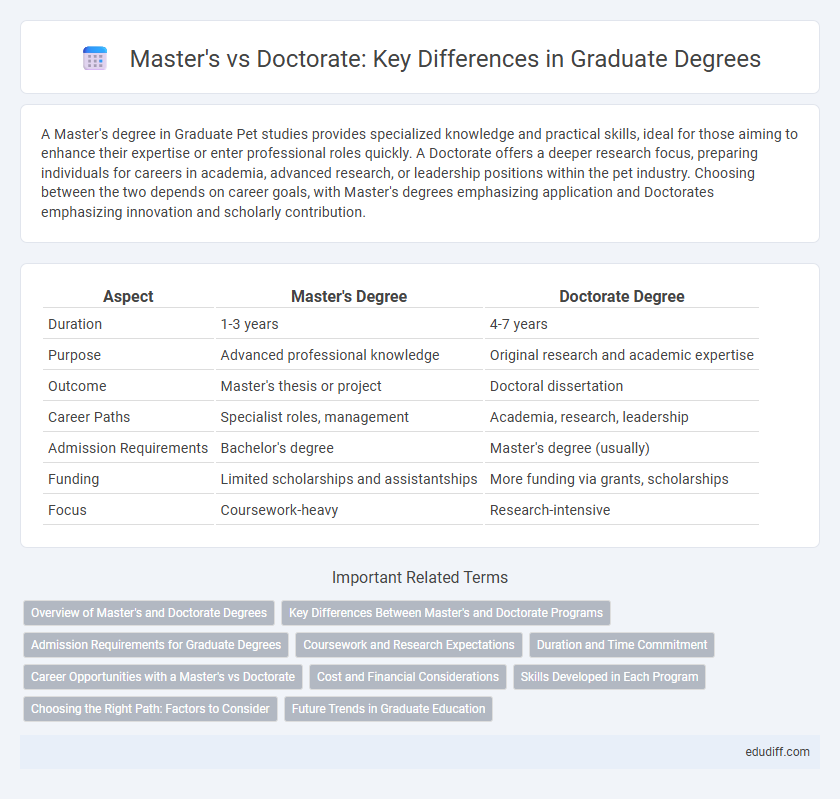A Master's degree in Graduate Pet studies provides specialized knowledge and practical skills, ideal for those aiming to enhance their expertise or enter professional roles quickly. A Doctorate offers a deeper research focus, preparing individuals for careers in academia, advanced research, or leadership positions within the pet industry. Choosing between the two depends on career goals, with Master's degrees emphasizing application and Doctorates emphasizing innovation and scholarly contribution.
Table of Comparison
| Aspect | Master's Degree | Doctorate Degree |
|---|---|---|
| Duration | 1-3 years | 4-7 years |
| Purpose | Advanced professional knowledge | Original research and academic expertise |
| Outcome | Master's thesis or project | Doctoral dissertation |
| Career Paths | Specialist roles, management | Academia, research, leadership |
| Admission Requirements | Bachelor's degree | Master's degree (usually) |
| Funding | Limited scholarships and assistantships | More funding via grants, scholarships |
| Focus | Coursework-heavy | Research-intensive |
Overview of Master's and Doctorate Degrees
Master's degrees typically require one to three years of specialized study beyond a bachelor's degree, emphasizing advanced knowledge and professional skills in a specific field. Doctorate degrees, such as Ph.D. or professional doctorates, demand several additional years focused on original research, contributing new knowledge to the discipline and often culminating in a dissertation. Both degrees enhance career prospects, with master's programs prioritizing applied expertise and doctorates emphasizing research and academic leadership.
Key Differences Between Master's and Doctorate Programs
Master's programs typically require 1-3 years of study with a focus on advanced coursework and practical skills, while doctorate programs demand 3-7 years, emphasizing original research and dissertation completion. The Master's curriculum often culminates in a thesis or project, whereas Doctorate candidates must produce a comprehensive dissertation contributing new knowledge to their field. Funding opportunities and career outcomes differ significantly, with doctorates qualifying graduates for academic, research, and high-level professional roles.
Admission Requirements for Graduate Degrees
Master's programs typically require a bachelor's degree with a minimum GPA, letters of recommendation, and standardized test scores such as the GRE or GMAT, depending on the field of study. Doctorate admissions demand a relevant master's degree or exceptional academic performance at the bachelor's level, a comprehensive research proposal, and often a strong record of publications or professional experience. Both degree levels require personal statements and interviews to assess the candidate's fit and motivation for advanced graduate study.
Coursework and Research Expectations
Master's programs prioritize structured coursework combined with a moderate research component, designed to build advanced knowledge and practical skills in a specific field. Doctorate programs emphasize original research contributions and extensive dissertation work, with coursework mainly supporting research methodologies and foundational theories. The time commitment for research in doctoral studies significantly exceeds that of master's degrees, reflecting the expectation for novel scholarly impact.
Duration and Time Commitment
Master's programs typically require 1 to 2 years of full-time study, involving coursework and a thesis or project, making them suitable for professionals seeking advanced knowledge in a shorter time frame. Doctorate programs demand a longer commitment of 4 to 7 years, emphasizing original research, comprehensive exams, and dissertation writing that require extensive dedication and time management. The substantial duration and intensity of doctoral studies impact career planning and personal life more significantly compared to master's programs.
Career Opportunities with a Master's vs Doctorate
Master's degree holders often access mid-level management and specialized professional roles, enhancing expertise and earning potential compared to bachelor's graduates. Doctorate recipients qualify for advanced research positions, academic careers, and leadership roles in innovation-driven industries, commanding higher salaries and greater job autonomy. Employers in sectors like healthcare, engineering, and academia heavily value doctoral qualifications for strategic decision-making and cutting-edge project management.
Cost and Financial Considerations
Master's programs generally incur lower tuition fees and shorter duration compared to Doctorate degrees, making them a more affordable option for many students. Doctorate degrees often require additional funding for research, extended living expenses, and potential income loss due to longer time commitments. Students should carefully evaluate available scholarships, assistantships, and loan options to manage the higher overall cost associated with doctoral studies.
Skills Developed in Each Program
Master's programs emphasize applied skills such as critical thinking, research methodology, and professional communication, preparing graduates for specialized industry roles. Doctorate programs develop advanced expertise in theoretical frameworks, original research design, and academic writing, equipping candidates for careers in academia and high-level research positions. Both degrees enhance problem-solving abilities, but doctorates foster innovation through contributing new knowledge to the field.
Choosing the Right Path: Factors to Consider
Choosing between a Master's and a Doctorate depends on career goals, time commitment, and desired expertise level. Master's programs typically offer practical skills for advancing in professional fields, while Doctorates focus on original research and academic contributions. Consider factors like industry requirements, financial investment, and long-term aspirations when selecting the appropriate graduate path.
Future Trends in Graduate Education
Master's and Doctorate programs are evolving to emphasize interdisciplinary research and practical skills aligned with emerging industries such as artificial intelligence and renewable energy. Graduate education increasingly incorporates online and hybrid learning models to enhance accessibility and flexibility for diverse student populations. Institutional partnerships with technology firms and global organizations drive innovation and real-world experience, shaping the future landscape of advanced degrees.
Master's vs Doctorate Infographic

 edudiff.com
edudiff.com